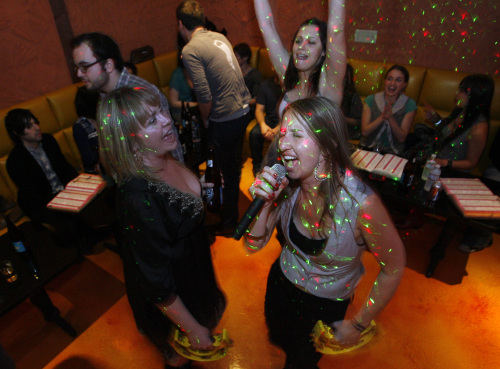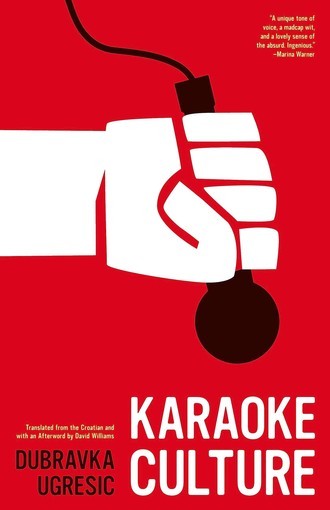Dubravka Ugresic does not like karaoke. That doesn’t stop her from trying it, just as her resistance to celebrity doesn’t stop her from putting her head through a cutout on a Hollywood studio tour so that she can be photographed with Clark Gable. Ugresic, a game and inquisitive critic, looks at culture from all angles, which sometimes means picking up the mic.
Karaoke recycles rather than creates, she argues in “Karaoke Culture,” the 100-page essay that lends its name to the title of her new collection. To Ugresic, karaoke is emblematic of our contemporary moment: She sees it as a sad attempt to adopt the trappings of celebrity, an art that’s derivative without enrichment and a practice that degrades the original because it can never be quite as good.
 |
People sing karaoke with friends at Rosen Music Studio, a karaoke/bar/restaurant in Los Angeles in 2010. (Lawrence K. Ho/Los Angeles Times/MCT) |
“In all its manifestations karaoke culture unites narcissism, exhibitionism and the neurotic need for the individual to inscribe him or herself on the indifferent surface of the world,” she writes. It’s not just singing on stages: Ugresic traces these themes in reality television, fandom, hobbyists, politics, art and, of course, the Internet.
The idea that today’s culture has traded creativity for a backward lens is in the ether ― it’s in Simon Reynolds’ book “Retromania” and recent buzzy articles by Kurt Andersen and Carl Wilson ― but Ugresic winds through it vividly and personally, indicting herself as much as the impoverished culture she critiques. Circling back to expropriation, she asks what the difference is between a postmodern reworking of “Alice in Wonderland,” say, and a fan fiction writer’s version. “(W)asn’t I the one who was,” she writes, “deconstructing texts to see how the mechanism worked, protected by trendy jargon like intertexuality and metatextuality? Didn’t I spread my literary feathers like a peacock, parading the elegance of my handiwork?” She is partly kidding. Even in translation, the voice of satire threads through.
Born in Yugoslavia in 1949, Ugresic, an academic, regularly attended international conferences and wrote magazine and newspaper pieces. After the country devolved into civil war in the early ‘90s, she wrote an article that caused a national uproar. As she writes of that time in the essay “A Question of Perspective,” she was pilloried in the press, ostracized at her university, and left her native Croatia for Amsterdam.

It’s hard to imagine an American cultural critic being the focus of so much negative attention, and the idea that writing about ideas could stir people so deeply is almost enviable ― almost. She lists what she was called: a “witch,” a “dirty liar” and a “traitor to the homeland.” She twists one insult ― that she has “deformed vision” ― to her own devices, turning it into a revision of John Berger’s ways of seeing. I’m no expert on Balkan politics, but she presents a strong case for the idea that if her “deformed vision” is wrong, she doesn’t want to be right.
Ugresic writes in short, episodic sections, making surprising leaps. An essay that begins with a Hemingway look-alike contest hops quickly to the arrest of Serbian war criminal Radovan Karadzic. The connections are electric: It’s an intellect in action, ideas zapping across the page.
The organization of an essay collection also allows the reader to begin making connections in the spaces between: Here Ugresic’s universal cultural criticism is front loaded. In the first half of the book, she writes of karaoke culture, YouTube, Obama, Internet surfing, the sex trade in Hong Kong, travel, minibars and IKEA. Later essays focus on Croatia and the powerful (and to her distasteful) idea of nation and homeland; one on the literature of a certain Central European mind-set is probably best tucked toward the end.
As she notes, perspective matters. Her final essay, “The Elusive Substance of the Archive,” balls up many threads she’d toyed with earlier, but the archive umbrella doesn’t contain them well. It’s only in the translator’s afterword that we realize the piece concluded an archive conference, where its odd reach and bright insights were delightfully welcome. That is the only piece so contextualized; the others are grounded only by the dates when they appeared.
Despite these small failings, “Karaoke Culture” is an essential investigation of our times. Ugresic’s best moments come when she connects the personal to the universal, when navigating a political storm is illustrated by her mother’s easy laughter in the face of unpleasantness, or when she extrapolates from her own Internet overuse: “Would Marcel Proust have written ‘In Search of Lost Time,’” she asks, “if he had had a Madeleine cookie on the computer screen in front of him?”
By Carolyn Kellogg
(Los Angeles Times)
(MCT Information Services)









